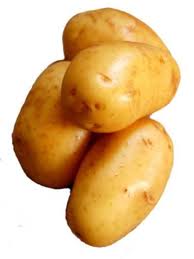
THE MISSIONARY POTATO.
IT wasn't a very large church, and it wasn't nicely furnished. No carpet on the floor, no frescoing on the walls; just a plain, square, bare, frame building, away out in Southern Illinois. To this church came James and Stephen Holt every Sabbath of their lives.
On this particular Sabbath they stood together over by the square box-stove, waiting for Sabbath-school to commence, and talking about the missionary collection that was to be taken up. It was something new for the poor church; they were used to having collections taken up for them.
However, they were coming up in the world, and wanted to begin to give. Not a cent had the Holt boys to give.
"Pennies are as scarce at our house as hen's teeth," said Stephen. James looked doleful. It was hard on them, he thought, to be the only ones in the class who had nothing to give. He looked grimly around on the old church. What should he spy, lying in one corner of a seat, but a potato.
"How in the world did that potato get to church?" he said, nodding his head toward it.
"Somebody must have dropped it that day we brought things here for the poor folks. I say, Stevie, we might give that potato. I suppose it belongs to us as much as to anybody."
Stephen turned, and gave a long, thoughtful look at the potato.
"That's an idea!" he said, eagerly.
"Let's do it!"
James expected to see a roguish look on his face, but his eyes and mouth said, "I'm in earnest!"
"Honor bright?" asked James.
"Yes, honor bright."
"How? Split it in two, and each put half on
the plate?"
"No," said Stephen, laughing; "we can't get it ready to give today, I guess; but suppose we carry it home, and plant it in the nicest spot we can find, and take extra care of it, and give every potato it raises to the missionary cause? There'll be another chance; this isn't the only collection the church will take up, and we can sell the potatoes to somebody."
Full of this new plan, they went into the class looking less sober than before; and though their faces were rather red when the plate was passed to them, and they had to shake their heads, they thought of the potato, and looked at each other and laughed.
Somebody must have whispered to the earth and the dew and the sunshine about that potato. You never saw anything grow like it! "Beats all,"
said farmer Holt, who was let into the secret. "If I had a twenty-acre lot that would grow potatoes in that fashion, I should make my fortune."
When harvesting came, would you believe that there were forty-one good, sound, splendid potatoes in that hill? Another thing; while the boys were picking them up, they talked over the missionary meeting that was to be held in the church next Thursday. An all day meeting. The little church had had a taste of the joy of giving, and was prospering as she had not before. Now for a big meeting, to which speakers from abroad were coming. James and Stephen had their plans made.
They washed the forty-one potatoes carefully, and wrote out in their best hand this sentence forty-one times:—
"This is a missionary potato; its price is ten cents; it is from the best stock known. It will be sold only to one who is willing to take a pledge that he will plant it in the spring, and give every one of its children to the missions. Signed, James and Stephen Holt." Each shining potato had one of these slips smoothly pasted to its plump side.
Didn't those potatoes go off, though! By three o'clock on Thursday afternoon not one was left, though one gentleman offered to give a gold dollar for one of them. Just imagine, if you can, the pleasure with which James and Stephen Holt put each two dollars and five cents into the collection that afternoon. I'm sure I can't describe it to you. But I can assure you of one thing: They each have a missionary garden, and it thrives.
Selected.